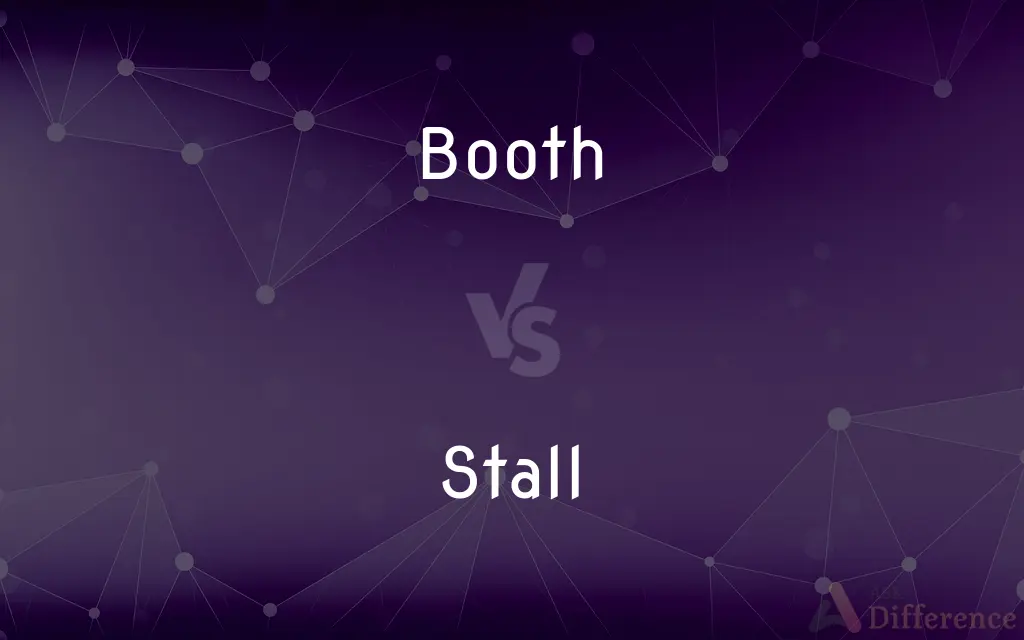Booth vs. Stall — What's the Difference?
By Fiza Rafique & Maham Liaqat — Updated on March 13, 2024
A booth is a temporary setup for selling goods, displaying information, or providing services, often enclosed; a stall is similar but can be more open, used in markets.

Difference Between Booth and Stall
Table of Contents
ADVERTISEMENT
Key Differences
Booths are often found at trade shows, exhibitions, and fairs, designed for selling goods, displaying information, or providing services. They are typically small, temporary structures that can be enclosed or semi-enclosed, offering a degree of privacy or separation from the surrounding environment. Stalls, on the other hand, are open, temporary setups used primarily in markets or fairs for selling goods, characterized by their accessibility and simplicity. They provide direct interaction with customers in a more open setting.
While booths are associated with a wide range of events, including both professional trade shows and public fairs, offering a versatile space for presentations, sales, or informational displays, stalls are more commonly associated with traditional markets, food fairs, and outdoor events. Stalls emphasize the sale of products such as food, crafts, and other goods, facilitating an open and accessible shopping experience.
In terms of design, booths may include features such as walls, counters, and sometimes even doors, allowing for a more controlled environment that can be customized to reflect the exhibitor's branding or presentation needs. Stalls, whereas, typically consist of a table, a roof or canopy, and sometimes side panels, focusing on functionality and ease of access rather than an immersive brand experience.
Booths are often equipped with various amenities to enhance the presentation or sales process, such as lighting, display racks, and multimedia systems. These features make booths suitable for detailed product demonstrations, interactive displays, or confidential consultations. Stalls, on the other hand, prioritize simplicity and mobility, with setups that can be quickly assembled and disassembled, making them ideal for vendors who participate in different markets or fairs frequently.
The choice between a booth and a stall often depends on the event's context and the exhibitor's objectives. Booths offer a more formal and structured environment, suitable for showcasing products or services in detail, while stalls provide a casual and open atmosphere, ideal for direct sales and interactions in a market setting.
ADVERTISEMENT
Comparison Chart
Setting
Trade shows, exhibitions, fairs.
Markets, fairs, outdoor events.
Design
Enclosed or semi-enclosed, can be elaborate.
Open, simple, functional.
Purpose
Selling, information display, services.
Primarily selling goods.
Features
Walls, counters, doors, display racks.
Table, roof/canopy, possibly side panels.
Environment
Controlled, can be customized for branding.
Open, accessible, easy interaction with customers.
Compare with Definitions
Booth
A temporary stand for selling or displaying goods at an event.
The artist set up a booth at the craft fair to sell her paintings.
Stall
An open or partially enclosed stand for selling goods at a market.
The fruit and vegetable stall at the market was very popular.
Booth
An enclosed or semi-enclosed area at a trade show for companies to display products.
Tech companies often have elaborate booths at electronics expos.
Stall
A compartment for a shower or toilet, providing privacy.
The public restroom was equipped with several clean stalls.
Booth
A small, often temporary structure for voting, information, or exhibitions.
Visitors gathered at the information booth to get brochures.
Stall
A protective covering or stand for books, artwork, or merchandise.
She browsed through the book stall for rare finds.
Booth
A seating area in a restaurant that is partially enclosed.
They requested a booth for more privacy during dinner.
Stall
A small enclosure for animals within a barn.
Each cow was led to its own stall at feeding time.
Booth
A small compartment for a specific use, such as a telephone booth.
He stepped into the telephone booth to make a call.
Stall
A fixed position without progress, often used metaphorically.
Negotiations hit a stall when neither side would compromise.
Booth
A small, often enclosed compartment, usually accommodating only one person
A voting booth.
Stall
A compartment for one domestic animal in a barn or shed.
Booth
A small enclosed compartment with a window, used to separate the occupant from others
A ticket booth.
Stall
A booth, cubicle, or stand used by a vendor, as at a market.
Booth
A seating area in a restaurant with a table and seats whose high backs serve as partitions.
Stall
A small compartment
A shower stall.
Booth
A small stall for the display and sale of goods.
Stall
An enclosed seat in the chancel of a church.
Booth
A small stall for the display and sale of goods.
Stall
A pew in a church.
Booth
An enclosure just big enough to accommodate one standing person.
Stall
Chiefly British A seat in the front part of a theater.
Booth
An enclosed table with seats, as in a diner or café.
Stall
A space marked off, as in a garage, for parking a motor vehicle.
Booth
An enclosure for keeping animals.
Stall
A protective sheath for a finger or toe.
Booth
A house or shed built of boards, boughs, or other slight materials, for temporary occupation.
Stall
The sudden, unintended loss of power or effectiveness in an engine.
Booth
A covered stall or other temporary structure in a fair, or market, or at a polling place.
Stall
A condition in which an aircraft or airfoil experiences an interruption of airflow resulting in loss of lift and a tendency to drop.
Booth
A partly enclosed area within a room for use of one or a small number of people, such as one in a restaurant having a table and seats, or one at an exhibition containing a display of products from one organization.
Stall
A ruse or tactic used to mislead or delay.
Booth
A small structure designed for the use of one person performing a special activity; as, a telephone booth; a highway toll booth; a projection booth; a guard booth.
Stall
To put or lodge in a stall.
Booth
A table (in a restaurant or bar) surrounded by two high-backed benches
Stall
To maintain in a stall for fattening
To stall cattle.
Booth
Small area set off by walls for special use
Stall
To halt the motion or progress of; bring to a standstill.
Booth
United States actor and assassin of President Lincoln (1838-1865)
Stall
To cause (a motor or motor vehicle) accidentally to stop running.
Booth
A small shop at a fair; for selling goods or entertainment
Stall
To cause (an aircraft) to go into a stall.
Stall
To live or be lodged in a stall. Used of an animal.
Stall
To stick fast in mud or snow.
Stall
To come to a standstill
Negotiations stalled.
Stall
To stop running as a result of mechanical failure
The car stalled on the freeway.
Stall
To lose forward flying speed, causing a stall. Used of an aircraft.
Stall
To employ delaying tactics against
Stall off creditors.
Stall
To employ delaying tactics
Stalling for time.
Stall
(countable) A compartment for a single animal in a stable or cattle shed.
Stall
A stable; a place for cattle.
Stall
A bench or table on which small articles of merchandise are exposed for sale.
Stall
(countable) A small open-fronted shop, for example in a market, food court, etc.
Stall
A very small room used for a shower or a toilet.
Stall
(countable) A seat in a theatre close to and (about) level with the stage; traditionally, a seat with arms, or otherwise partly enclosed, as distinguished from the benches, sofas, etc.
Stall
(Germanic paganism) An Heathen altar, typically an indoor one, as contrasted with a more substantial outdoor harrow.
Stall
A seat in a church, especially one next to the chancel or choir, reserved for church officials and dignitaries.
Stall
A church office that entitles the incumbent to the use of a church stall.
Stall
A sheath to protect the finger.
Stall
(mining) The space left by excavation between pillars.
Stall
(Canadian) A parking stall; a space for a vehicle in a parking lot or parkade.
Stall
An action that is intended to cause, or actually causes, delay.
His encounters with security, reception, the secretary, and the assistant were all stalls until the general manager's attorney arrived.
Stall
(aeronautics) Loss of lift due to an airfoil's critical angle of attack being exceeded, normally occurring due to low airspeed.
Stall
(transitive) To put (an animal, etc.) in a stall.
To stall an ox
Stall
To fatten.
To stall cattle
Stall
(obsolete) To live in, or as if in, a stall; to dwell.
Stall
To place in an office with the customary formalities; to install.
Stall
To forestall; to anticipate.
Stall
To keep close; to keep secret.
Stall
(transitive) To employ delaying tactics against.
He stalled the creditors as long as he could.
Stall
(intransitive) To employ delaying tactics; to stall for time.
Soon it became clear that she was stalling to give him time to get away.
Stall
(intransitive) To come to a standstill.
Stall
(transitive) To cause to stop making progress; to hinder; to slow down; to delay or forestall.
Stall
To exceed the critical angle of attack, resulting in loss of lift.
Stall
To cause to exceed the critical angle of attack, resulting in loss of lift.
The pilot stalled the plane by pulling the nose up too high at a slow airspeed.
Stall
To plunge into mire or snow so as not to be able to get on; to set; to fix.
To stall a cart
Stall
To stop suddenly.
Stall
To cause the engine of a manual-transmission car or truck to stop by going too slowly for the selected gear.
Stall
(obsolete) To be stuck, as in mire or snow; to stick fast.
Stall
(obsolete) To be tired of eating, as cattle.
Stall
A stand; a station; a fixed spot; hence, the stand or place where a horse or an ox is kept and fed; the division of a stable, or the compartment, for one horse, ox, or other animal.
Stall
A stable; a place for cattle.
At last he found a stall where oxen stood.
Stall
A small apartment or shed in which merchandise is exposed for sale; as, a butcher's stall; a bookstall.
Stall
A bench or table on which small articles of merchandise are exposed for sale.
How peddlers' stalls with glittering toys are laid.
Stall
A seat in the choir of a church, for one of the officiating clergy. It is inclosed, either wholly or partially, at the back and sides. The stalls are frequently very rich, with canopies and elaborate carving.
The dignified clergy, out of humility, have called their thrones by the names of stalls.
Loud the monks sang in their stalls.
Stall
In the theater, a seat with arms or otherwise partly inclosed, as distinguished from the benches, sofas, etc.
Stall
The space left by excavation between pillars. See Post and stall, under Post.
Stall
A covering or sheath, as of leather, horn, of iron, for a finger or thumb; a cot; as, a thumb stall; a finger stall.
Cries the stall reader, "Bless us! what a word onA titlepage is this!"
Stall
To put into a stall or stable; to keep in a stall or stalls; as, to stall an ox.
Where King Latinus then his oxen stalled.
Stall
To fatten; as, to stall cattle.
Stall
To place in an office with the customary formalities; to install.
Stall
To plunge into mire or snow so as not to be able to get on; to set; to fix; as, to stall a cart.
His horses had been stalled in the snow.
Stall
To forestall; to anticipate.
This is not to be stall'd by my report.
Stall
To keep close; to keep secret.
Stall this in your bosom.
Stall
To live in, or as in, a stall; to dwell.
We could not stall togetherIn the whole world.
Stall
To kennel, as dogs.
Stall
To be set, as in mire or snow; to stick fast.
Stall
To be tired of eating, as cattle.
Stall
A compartment in a stable where a single animal is confined and fed
Stall
Small area set off by walls for special use
Stall
A booth where articles are displayed for sale
Stall
A malfunction in the flight of an aircraft in which there is a sudden loss of lift that results in a downward plunge;
The plane went into a stall and I couldn't control it
Stall
Small individual study area in a library
Stall
A tactic used to mislead or delay
Stall
Postpone doing what one should be doing;
He did not want to write the letter and procrastinated for days
Stall
Come to a stop;
The car stalled in the driveway
Stall
Deliberately delay an event or action;
She doesn't want to write the report, so she is stalling
Stall
Put into, or keep in, a stall;
Stall the horse
Stall
Experience a stall in flight, of airplanes
Stall
Cause an airplane to go into a stall
Stall
Cause an engine to stop;
The inexperienced driver kept stalling the car
Common Curiosities
Are booths more customizable than stalls?
Yes, booths tend to offer more customization options for branding and presentations, while stalls prioritize functionality and mobility.
How do booths and stalls differ in design?
Booths may be enclosed or semi-enclosed with features like counters and display racks, while stalls are more open and simple, often just a table and canopy.
What is a stall?
A stall is an open or partially open space used primarily in markets or fairs for the sale of goods, emphasizing ease of access and direct customer interaction.
Can both booths and stalls be used for selling products?
Yes, both can be used for selling products, but booths are also suited for informational displays and services, while stalls are traditionally for direct sales in markets.
Do booths or stalls offer better interaction with customers?
Stalls typically offer better direct interaction due to their open design, while booths can offer a more intimate setting for engagement within an enclosed space.
Can a stall be considered a type of booth?
While similar in purpose, stalls are specifically designed for open market settings and are not typically enclosed, making them distinct from booths.
Where are stalls commonly found?
Stalls are commonly found in traditional markets, food fairs, and outdoor events, where vendors sell a variety of goods directly to customers.
What is a booth?
A booth is a temporary setup often found at events like trade shows or fairs for selling goods, displaying information, or providing services, sometimes enclosed for privacy.
Can both booths and stalls be used for food sales?
Yes, both can be used for selling food, with booths often found at indoor events or exhibitions and stalls more common at outdoor markets and fairs.
How does the cost of setting up a booth compare to a stall?
Setting up a booth can be more costly due to its potentially elaborate design and features, whereas stalls generally have lower setup costs due to their simplicity.
Can booths provide a more controlled environment?
Yes, booths can provide a more controlled and private environment, suitable for detailed presentations or confidential services.
Is it easier to set up a stall compared to a booth?
Generally, yes, stalls are designed for easy assembly and disassembly, making them convenient for vendors who frequently move between locations.
Are booths used for professional events only?
Booths are commonly used in professional and trade events but can also be found in public fairs and exhibitions, serving various purposes.
Can stalls be found indoors?
Yes, stalls can be set up indoors, especially in covered markets or exhibition halls, although they are more commonly associated with outdoor settings.
Do booths and stalls require permits?
Depending on the location and event, both booths and stalls might require permits, especially when used for commercial activities.
Share Your Discovery

Previous Comparison
Elk vs. Antelope
Next Comparison
Bought vs. PurchasedAuthor Spotlight
Written by
Fiza RafiqueFiza Rafique is a skilled content writer at AskDifference.com, where she meticulously refines and enhances written pieces. Drawing from her vast editorial expertise, Fiza ensures clarity, accuracy, and precision in every article. Passionate about language, she continually seeks to elevate the quality of content for readers worldwide.
Co-written by
Maham Liaqat















































